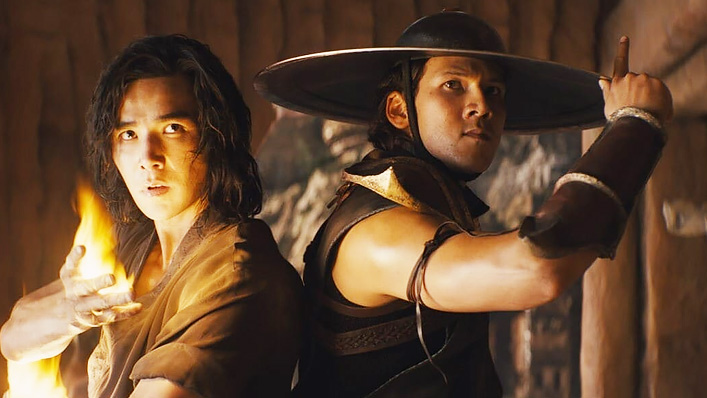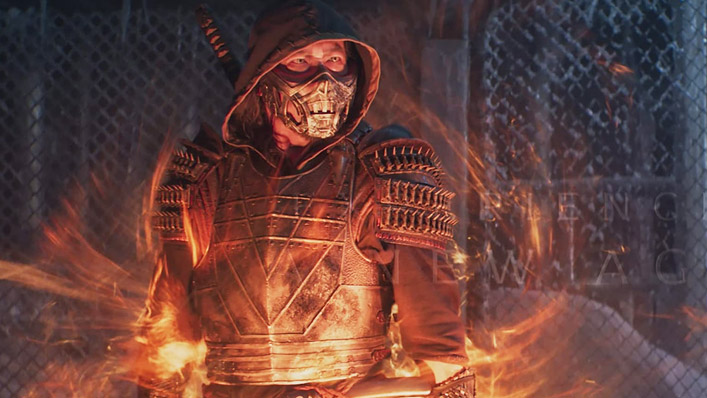Seriousness and silliness collide in the popcorn spectacle of Mortal Kombat

The new Mortal Kombat ain’t social realism—and yet its ridiculousness is treated very matter-of-factly, writes critic Luke Buckmaster.
Don’t you hate it when you pop out for a bit of fresh air, then return home to discover your wife and child have been turned into a popsicle by the arctic-summoning Grandmaster of the Lin Kuei clan? This Seinfeldian event is how the new Mortal Kombat movie begins, with family man Hanzo Hasashi (Hiroyuki Sanada) miffed about the whole death of his loved ones thing and Bi-Han aka Sub-Zero (Joe Taslim) the literally ice cool bad guy.
It’s very very silly but treated very very seriously by director Simon McQuoid, who is very very conscious of what he’s doing. In fact he recently told The Age: “There’s so much stuff now that’s totally visual effects, and really great visual effects, it’s just that I think you can never beat reality.”
You can…never beat reality? One expects such words from a director of a social realist drama about potato farmers, not a supernatural fantasy involving a soul-eating sorcerer and a tournament that determines the fate of earth. But I get his point: the film is not realism in the sense of being a window to the world, but in matter-of-fact execution of ridiculousness. There is no tongue in cheek and in fact no tongue: it’s been ripped out and hurled into the sun during one of the franchise’s signature ‘fatalities’.

I thought quite a lot about this film’s seriousness as I watched it, partly because a far less serious production was fresh on my mind, with in fact the exact same title: the 1995 Mortal Kombat movie, which I’d rewatched the previous evening. In one scene in the ‘95 version a defeated character is absorbed into the aforementioned soul imbiber, after transmogrifying into a miniature version of himself that sails through the air horizontally—in the Superman flight pose—and is sucked into the eyeball of the sorcerer.
McQuoid does not restage this particular moment, presumably because there is no way to do it and not have it look completely preposterous. This is not a film that wants to look preposterous. It gives higher precedence to the term “cinematic”, one early close-up shot of blood on green leaves making the point that it is intended to be an atmospherically rich production rather than a zany spectacle. For a while I found it too heavy-handed, but after the film hits an hour or so I became accustomed to its rhythms and found it had a decent sense of scale and largesse, and was quite well paced.
The seriousness is an issue, however, including when Mortal Kombat is being funny. When Sonya (Jessica McNamee) explains that there’s an upcoming tournament, you want to laugh, because the moment is so contrived—but you know you shouldn’t. The bits intended to be comedic on the other hand are written in highlighter pen, many involving a very bloody frickin’ ‘strayan stone the crows performance from Josh Lawson as Kano, a true blue mercenary who has raffish charm but also a dangerous edge, as well as a laser beam coming out of his eye activated by Hulk-like bursts of anger.
The fight scenes, of which there are many, are certainly more convincingly staged than in the ‘95 adaptation, which is one of those galumphing martial arts movies in which the characters, amid the heat of battle, politely wait their turn to perform counter attacks. This time the fight scenes are not knowing or self-conscious until they get to the bits where they have to be: the aforementioned ‘fatalities’.
To call these moments of climactic grotesquery pointlessly gratuitous would be rather snobbish, and just plain wrong. Gratuity is their point, their sine qua non, their raison d’être, or any other spiffy words we can use to describe the fine art of decapitations and inners-spraying. Therefore they cannot be pointless. Like the catharsis experienced by Colosseum crowds in ancient Rome who watched gladiators fight to the death, or people who attended public stonings and maybe threw a cheeky rock or two, the Mortal Kombat fatalities nourish a profound human desire prevalent since the days of yore: to observe somebody die who isn’t you.
At least now we are doing it by mashing buttons on a controller in order to move an animated character. Or, as the case may be, watching a reasonably entertaining popcorn movie that exists in the compromised but not uninhabitable space between seriousness and stupidity. That, as they say, is progress of a kind.

















